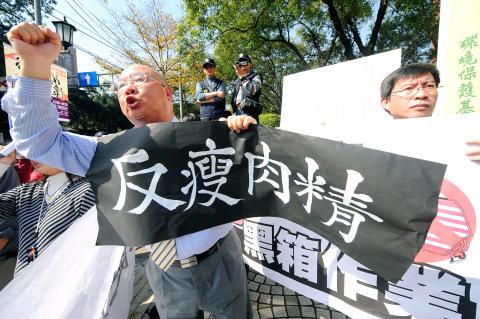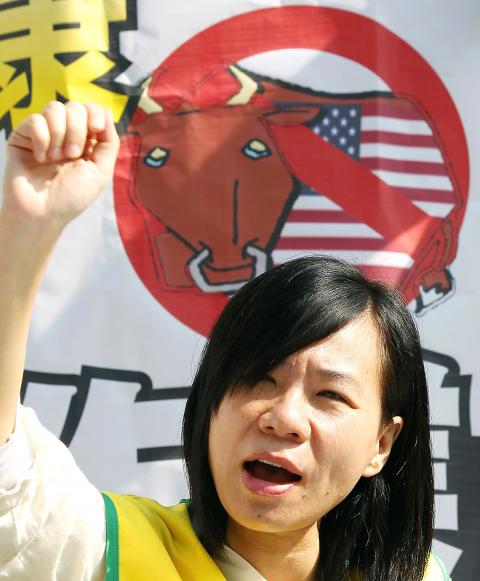An expert who had been invited to give his views at an inter-ministerial meeting on the issue of US beef imports yesterday left about 10 minutes after the meeting began, saying that the process was not transparent.
Chou Chin-cheng (周晉澄), dean and chairman of the Institute of Veterinary Clinical Science at National Taiwan University’s School of Veterinary Medicine, walked out of the meeting — the second to be held on the controversy surrounding ractopamine residue in US beef imports — after his request that the Council of Agriculture make the transcripts of the meeting public was rejected.
“The government has to publicize all the information it bases its decisions on, regardless of whether the information is correct or incorrect,” Chou told reporters.

Photo: CNA
He said he was the only participant who wanted the council to provide either a transcript or video of the meeting to the public.
If the government really welcomes various opinions, the different views expressed in the meeting should be made public — not just the conclusions, Chou said.
Chou said he would attend the next committee meeting if invited, but would again insist that the discussions be made public.

Photo: Pichi Chuang, Reuters
At a press conference afterward, Council of Agriculture Deputy Minister Hu Sing-hwa (胡興華) said a majority of the participants were in favor of a closed-door meeting and opposed the release of a transcript so they could speak freely.
Democratic Progressive Party Legislator Tien Chiu-chin (田秋堇) and Taiwan Solidarity Union Legislator Lin Shih-chia (林世嘉) led about 30 people from nine civic groups in a small protest outside the council’s headquarters as the meeting was being held.
“We have three demands. First, as the issue is a public health matter, there is no room for compromise with the US. Second, the council has to open all of its meeting records for public inspection. Third, the committee should be reshuffled,” Homemakers’ Union and Foundation chairperson Chen Man-li (陳曼麗) said.
While the first meeting on the issue was criticized for being one-sided, several experts from the private sector who oppose the use of ractopamine in animal feed were invited to yesterday’s meeting, although they were in the minority.
Premier Sean Chen (陳冲) said the government would intensify its efforts to enforce control measures on feed additives.
His comments came after reports that traces of ractopamine residue had been found in US beef products in the local market.
The government could increase the inspection rate on US beef imports or revoke licenses from importers that fail to enforce restrictions on US beef imports that contain ractopamine residue, Chen said.
His comments came after some hypermarket chains, including Carrefour, RT-Mart and A-Mart, temporarily removed US beef products from their shelves after the products were found to contain traces of ractopamine.
“The use of beta-agonists [like ractopamine] is still banned. Sale of any meat which contains the substance is illegal.” the premier said.
Importers found violating the regulation would be subject to higher border inspection rates or could have import permits revoked,” he said.
Under pressure from Washington, where research has shown that ractopamine, a leanness-promoting agent, is used in the raising of 45 percent of US pigs and 30 percent of ration-fed cattle, the government has resigned itself to considering lifting the ban.
It is holding a series of inter-ministerial committee meetings to address the issue and set up a task force to re-examine the health risks surrounding ractopamine.
The moves have ignited consumer concerns over the safety of US beef. Local authorities recently began testing samples of US beef sold at hypermarkets to ascertain whether residue from drugs banned in Taiwan could be detected.
Two samples of US beef sold at RT-Mart and Carrefour in Taipei were found to have ractopamine residue, among a total of six items tested; in Greater Kaohsiung, traces of ractopamine were found in three of six items sold at Dollars and RT-Mart.
Kung Tsau-lien (鞏彩蓮), a representative of RT-Mart, said that all US beef products sold by the company were accompanied with certificates of export and certificates of quarantine from the US, as well as certificates of compliance issued by the Department of Health and the Council of Agriculture.
“It seems that [the certificates] were not enough,” Kung said.
Carrefour public relations manager Ho Mo-chen (何默真) said the company had pulled all US beef products from shelves and referred the products for testing.
“To safeguard consumers’ interest, we would not put them on the shelves unless they are assured it is ractopamine-free,” she said.
Additional reporting by CNA

CHAOS: Iranians took to the streets playing celebratory music after reports of Khamenei’s death on Saturday, while mourners also gathered in Tehran yesterday Iranian Supreme Leader Ayatollah Ali Khamenei was killed in a major attack on Iran launched by Israel and the US, throwing the future of the Islamic republic into doubt and raising the risk of regional instability. Iranian state television and the state-run IRNA news agency announced the 86-year-old’s death early yesterday. US President Donald Trump said it gave Iranians their “greatest chance” to “take back” their country. The announcements came after a joint US and Israeli aerial bombardment that targeted Iranian military and governmental sites. Trump said the “heavy and pinpoint bombing” would continue through the week or as long

TRUST: The KMT said it respected the US’ timing and considerations, and hoped it would continue to honor its commitments to helping Taiwan bolster its defenses and deterrence US President Donald Trump is delaying a multibillion-dollar arms sale to Taiwan to ensure his visit to Beijing is successful, a New York Times report said. The weapons sales package has stalled in the US Department of State, the report said, citing US officials it did not identify. The White House has told agencies not to push forward ahead of Trump’s meeting with Chinese President Xi Jinping (習近平), it said. The two last month held a phone call to discuss trade and geopolitical flashpoints ahead of the summit. Xi raised the Taiwan issue and urged the US to handle arms sales to

BIG SPENDERS: Foreign investors bought the most Taiwan equities since 2005, signaling confidence that an AI boom would continue to benefit chipmakers Taiwan Semiconductor Manufacturing Co’s (TSMC, 台積電) market capitalization swelled to US$2 trillion for the first time following a 4.25 percent rally in its American depositary receipts (ADR) overnight, putting the world’s biggest contract chipmaker sixth on the list of the world’s biggest companies by market capitalization, just behind Amazon.com Inc. The site CompaniesMarketcap.com ranked TSMC ahead of Saudi Aramco and Meta Platforms Inc. The Taiwanese company’s ADRs on Tuesday surged to US$385.75 on the New York Stock Exchange, as strong demand for artificial intelligence (AI) applications led to chip supply constraints and boost revenue growth to record-breaking levels. Each TSMC ADR represents

State-run CPC Corp, Taiwan (CPC, 台灣中油) yesterday said that it had confirmed on Saturday night with its liquefied natural gas (LNG) and crude oil suppliers that shipments are proceeding as scheduled and that domestic supplies remain unaffected. The CPC yesterday announced the gasoline and diesel prices will rise by NT$0.2 and NT$0.4 per liter, respectively, starting Monday, citing Middle East tensions and blizzards in the eastern United States. CPC also iterated it has been reducing the proportion of crude oil imports from the Middle East and diversifying its supply sources in the past few years in response to geopolitical risks, expanding